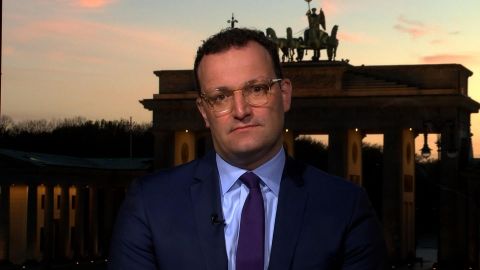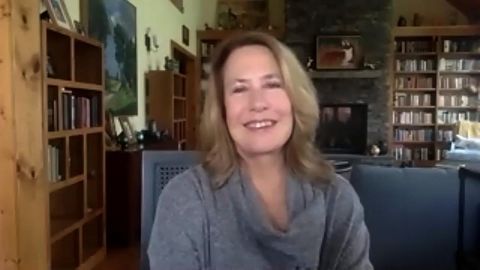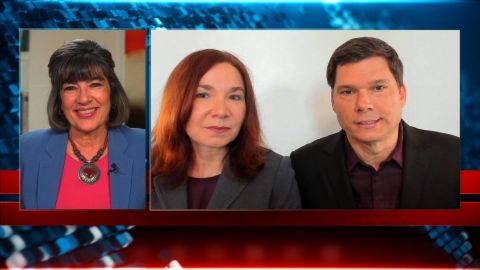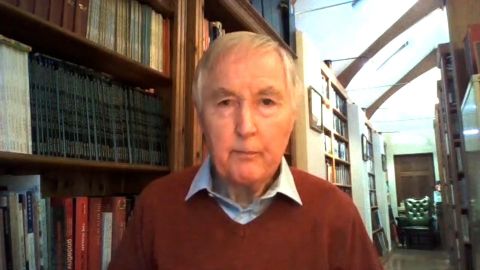Read Transcript EXPAND
CHRISTIANE AMANPOUR: Now, as we mentioned earlier, 22 million Americans filed for unemployment benefits in the last month. And the whole global economy has taken a beating. Our next guest, Sheila Bair, was chair of the Federal Deposit Insurance Corporation. That is the agency designed to make banking safer for consumers like you and me. She was once called the little guy’s protector in chief. And she joins contributor Sheelah Kolhatkar to discuss how not to repeat the mistakes of the 2008 bailout.
(BEGIN VIDEOTAPE)
SHEELAH KOLHATKAR, CNN INTERNATIONAL CONTRIBUTOR: Sheila Bair, thank you so much for joining us.
SHEILA BAIR, FORMER CHAIR, FEDERAL DEPOSIT INSURANCE CORPORATION: Happy to be here.
KOLHATKAR: In March, Congress passed the CARES Act, a $2 trillion bill intended to extend aid to families, businesses large and small across the country. And this is an enormous transfer of taxpayer funds to private businesses. The potential for abuse for fraud, for waste, for the dispensation of political favors is obviously very high. How would you rate the oversight mechanisms that have been attached to this emergency money?
BAIR: It does authorize an inspector general to provide oversight of this, as well as a congressional oversight committee, similar to what we had when — with the TARP funds that were appropriated during the great financial crisis. Frankly, those tools could have been stronger. There’s really no job protection for the I.G., as we see. That perhaps is a problem. And then the oversight commission has no subpoena authority. So, it can hold hearings, but it can’t require the presentation of witnesses or documents. So, I think those things help. I think the restrictions on buybacks and dividends was appropriate. It’s not to say shareholders are bad people or anything like that. They’re not. But the best use of capital right now is not for shareholder payouts or a lot of executive compensation. The priority right now should be on operations. So those legal restrictions that were placed not only on the industry-specific assistance to airlines, but also more generally to this $500 billion worth of federal reserve lending facility, those restrictions apply as well. And I think they were appropriate.
KOLHATKAR: Yet President Trump just removed the inspector general who had been appointed to oversee that money. You know, does this raise concerns for you about what’s going to happen with that bailout?
BAIR: Well, it does. I mean, I think it creates a chilling effect, clearly. And you do want some stringent oversight. I would like to think and hope that corporate recipients of this aid will understand the terrible crisis that our country is in and will responsibly use the funds where it’s really needed, which is support operations and payroll. But a little oversight of that will help discipline, I think, keep everybody more honest. So the thought that this I.G. is not going to be independent, could be fired at whim, is troubling. And that’s not to get into the particular person or candidate. I don’t weigh in on that. I don’t know the person. But I think the process was not a good one. And we need whoever that person is to feel empowered to do his or her job, without fear of reprisals.
KOLHATKAR: Congress had a lot of leverage when they were debating this bill. And they obviously were in a position to ask a lot of the companies who were going to be receiving taxpayer money. And there was a lot of talk about restricting stock buybacks, restricting the use of the money for executive compensation, requiring companies to commit to retaining workers. However, there’s concern now that some of those conditions were not strict enough. What do you think?
BAIR: Well, we don’t know. As far as I know, Secretary Mnuchin has not granted any exceptions. There is another concern, which is that the Fed has its own facilities too that is provided to intervene in corporate debt markets, to lend to larger businesses, which were not covered under the CARES Act. And so those restrictions generally are not applying to the Fed programs. It’s just the programs which are really directly tied to CARES Act funding where we’re seeing those restrictions apply. So, it does create a concern whether this is going to be a giant loophole. But my worst nightmare, my worst nightmare in all of this is that three months from now, four months from now, we look back on this. Where did the money go? Who got helped? OK, here we go again. Wall Street got the money, big corporations got the money, private equity funds got the money, still trying to get those checks out in the small businesses and households. And that will just — first of all, it’s wrong, but it will also just creates so much more of political cynicism and upheaval. That’s the last thing our country needs right now. We need to come together. So, again, I hope government will have consistent restrictions across the board, but also that companies themselves should exercise some self-restraint, understand we’re in a crisis and help your workers. Don’t be trying to line your own pockets right now with this money.
KOLHATKAR: Should we be bailing out companies like Boeing?
BAIR: No, I got to tell you, I don’t have much sympathy for Boeing. I think there is a real issue, companies that were obviously in serious trouble before this happened, having nothing to do with COVID-19. I know that’s a little — sometimes, that can be judgmental, but Boeing is such an obvious outlier in this. No, I think Boeing should have more like the process we used with GM, where you take them through some type of structured reorganization or bankruptcy, continue to fund the company, so employees can keep their jobs they can keep production. But, clearly, there’s a profound cultural issue. I call it the Wells Fargo of the aircraft industry, because it just seems like there’s a very bad cultural issue. And we really — I don’t see a lot of changes at the top. The board is basically — what the board was, a member of the board, the lead director for many years, is now the CEO. I’m not sure what that accomplishes. And so, yes, I think we need a fundamental change at the top.
KOLHATKAR: What about the airline industry itself?
BAIR: Well, there again, I think some are more sympathetic than others. Some — airlines have been right up there with bags. They have been up there with the buyback activity. So — and they have taken out a lot of debt, so that makes them less sympathetic. On the other hand, transportation has been hit, obviously, very hard, with the government-ordered shutdowns and social distancing requirements. So, I do think it’s appropriate to help them. But, again, maintaining those restrictions on buybacks, dividends, executive compensation, which Mr. Mnuchin has done — doing at this point. He’s also requiring that they give — provide some equity investment to the government. So, I mean, that has its pros and cons, but one of the pros is, when those companies come back, the share price will go up significantly, and that will help cover the risk of losses to the government. So, for now, it’s look like Treasury is being pretty tough with the airlines. And I think we should feel good about that.
KOLHATKAR: The Treasury secretary, Steve Mnuchin, has an enormous amount of discretion in terms of handing out this bailout money, who gets what. In 2008, he was part of an investor group that took over a failing mortgage lender in California, IndyMac. The company went on to foreclose on 36,000 homeowners, and there was some controversy about that. Do you think he’s the appropriate person to be playing this role in this current crisis?
BAIR: Well, a couple of things. I think, so far, I would give him high marks. He supported these restrictions. He’s — so far, he’s refusing to grant exceptions. So I do think we need to give him credit for that. He’s a Wall Street guy, no doubt about it. And so I think it’s not — it’s fine to have Wall Street people with Wall Street experience in your administration, but you need a diverse group of people with diverse perspectives providing input for these programs. In regard to the foreclosure activity, I don’t — some of that, I’m personally familiar with. Some of it, I’m not. But I will say, in his defense, IndyMac Bank was a very, very weak bank that, when it failed, already had a lot of borrowers who had not paid for several months, who had abandoned the property. They also had, unlike — different from a lot of the other mortgage lending, but that particular bank had made a lot of loans to people who were making investments. They weren’t living in the property. So I do think, in fairness to him, that drove up the foreclosure numbers in a way that probably differentiated IndyMac, the bank that he and his consortium bought, from other mortgage lenders. So, I do think that needs to be noted. So I don’t — I can’t agree with everything this administration has done. I had a lot of problems with the tax bill. I won’t say I agree with everything. But, on this one, I’m going to be hopeful that he also holds the line. It’s interesting. One — during the 2008 crisis, Hank Paulson was really the only one of the team dealing with this that had worked on Wall Street. But I actually found that he could be tougher than Tim Geithner or Ben Bernanke. And I think one of the reasons was is, he knew Wall Street. He knew when he was being played or when they really needed help. So, I’m hoping that maybe Mr. Mnuchin’s Wall Street experience will make him skeptical and cynical when some of these folks come with their palms out wanting some help. So I’m going to hope for the best here. But, so far, I really like the fact that he has said no to all these requests make exceptions to the restrictions back in the CARES Act.
KOLHATKAR: In 2008, there was a real sense — afterwards, there was a real growing public outrage about the way things have played out, a feeling that the banks have been saved, a lot of the senior executives were making more money than ever, bank profits recovered very quickly.
BAIR: Right.
KOLHATKAR: But average wages, earnings of American families took years to recover. So how can we prevent that from happening again?
BAIR: Part of the problem is, we have financialized our economy. So every time we get into a crisis, we default to the Fed. And I’m not blaming the Fed on this. Congress has — saw — found it easy to cede economic policy to the Fed. And what the Fed does is, they lower interest rates, and they put a lot of money into big banks, because those are their tools. That’s an observation. It’s not a criticism. But then, with every cycle, you get more debt, you get a bigger financial sector. It’s not sustainable. You get asset bubbles. At some point, people only borrow so much. The debt has to be repaid. The cycle is just not sustainable. So, I celebrate the fact that we’re focusing more on grants now to help alleviate this crisis. I actually think, for small businesses, they could provide additional assistance. They should think about this district grant assistance too, instead of loans. Those loans are forgivable, but get away from these debt-infused credit bubbles to drive our economy, downsize the financial sector. We should have done that after 2008. Maybe this time around, it will give us some better political will to do so. I also think the transmission mechanism — and I wrote a piece on this morning, that the Fed as an administrator of providing funding could actually be quite helpful. There’s new technology now that basically would allow businesses and households to have the equivalent of their own reserve account at the Fed, which is what, of course, the big banks have, why it’s so easy to get money to them very quickly. So, technology is there to do that. And a couple years ago, that seemed like a really kind of out-there idea. But there’s a growing — there are actually some central banks experimenting with it now, and a growing number of experts saying, yes, we have the technology, so that the Fed as administrator could get funds much more quickly to households and businesses than the current kind of antiquated payment system we have.
KOLHATKAR: Sheila Bair, thank you so much for being with us.
BAIR: Thanks for having me.
About This Episode EXPAND
Christiane speaks with German Health Minister Jens Spahn, climate scientist Katharine Hayhoe, Pastor Andrew Farley, and historian Archie Brown. Sheela Kolhatkar speaks with former FDIC chair Sheila Bair.
LEARN MORE



